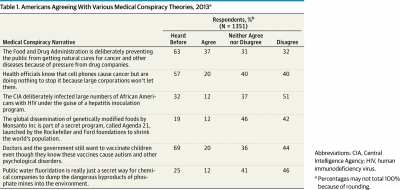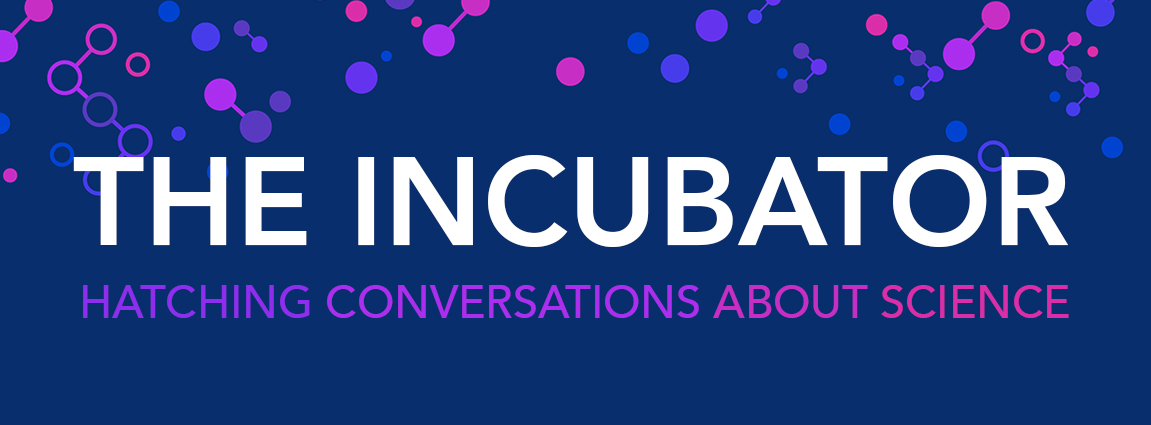Why do half of Americans believe in medical conspiracies?
By Alison Carley
All I have on my side is facts and science, and people hate facts and science.
–Leslie Knope, Parks and Recreation
While I was writing a proposal for my qualifying exam, I hit what felt at the time like an insurmountable roadblock. Articles by important scientists in reputable journals seemed to be making completely contradictory statements. “Protein X is critical to process Z,” or, “Protein X is definitely not involved in process Z,” or my favorite, “Process Z doesn’t even exist!” What was I supposed to think?
Just like I had trouble getting to the truth behind process Z, many Americans struggle to understand complex issues in science and medicine.
Vaccines cause autism, doctors know this but give them anyway. There is a cure for cancer, but the FDA is preventing its release because of pressure from drug companies. Health officials know that cell phones cause cancer but aren’t doing anything because of pressures from large corporations. Nearly half of all surveyed Americans believe at least one of these conspiracy theories according to a recent article published in JAMA Internal Medicine. Moreover, of the seven medical conspiracy theories included in the survey, 18% of respondents reported that they believe three or more!

As a cancer biologist, this is quite alarming. The idea that there’s a cancer cure but everyone working in the field is keeping it a secret is so outrageous that it is almost laughable. Not to mention the persistence of the debunked link between vaccines and autism, a conspiracy theory that has led to multiple outbreaks of preventable diseases and continues to siphon funding from legitimate autism research. Although a lot of time and effort has gone into dismantling such medical conspiracy theories, people are clearly still buying into them.
It is unfair, however tempting, to simply dismiss those who believe such things as uninformed or imperceptive. It can be difficult to weed out fact from fiction, good sources from bad ones. When it’s hard to get to the truth even looking at reputable journals, and when you consider the amount of misinformation on the internet, and on the increasingly partisan news, it’s no wonder these ideas are propagated.
The survey found that people who believed in conspiracies were more likely to use alternative medicine and avoid traditional medicine, more likely to buy organic foods, use herbal supplements, and avoid sunscreen, flu shots, and annual checkups. This suggests, as the authors argue, that people who believe in conspiracy theories aren’t a “delusional fringe of paranoid cranks,” but that conspiratorial thinking is widespread and predictive of common health behaviors. They write that “[r]ather than viewing medical conspiracism as indicative of a psychopathological condition, we can recognize that most individuals who endorse these narratives are otherwise ‘normal’.”
The JAMA Internal Medicine study is similar to another by the same authors in the American Journal of Political Science, in which they found that about half of Americans believe in at least one political conspiracy theory. These include that President Obama wasn’t born in the US, or that government officials planned 9/11. They found that most people only subscribe to conspiracies that fit a narrative in line with their other beliefs. Interestingly, one particular ideology was not more likely to believe in conspiracy theories, but rather that ideology informs which conspiracies someone believes in if they are predisposed to believe in conspiracies in general.
In this paper, they argue that belief in conspiracy is due not to misinformation, paranoia, or political mistrust, but is instead due to two common tendencies. The first is a “propensity to attribute the source of unexplained or extraordinary events to unseen, intentional forces.” This relates to a “bias to draw causal connections between seemingly related phenomena” and “to presume predators are behind unknown or novel stimuli.” The second tendency “is a natural attraction toward melodramatic narratives as explanations for prominent events, particularly those that interpret history relative to universal struggles between good and evil.” The authors point out that “narrative structuring of information is central to human cognition and facilitates the organization of memory and reasoning.” They synthesize all this into a hypothesis, that conspiracy theories are attractive because their narrative structures of good versus evil accord with how some process information. Conspiracy theories, they hypothesize, provide “compelling explanations for otherwise confusing or ambiguous events.”
It’s hard to argue with people who don’t believe the experts or who believe the experts are “evil” and out to get them. How do you convince someone that their beliefs are wrong when they get their information from people with no background in science, and don’t trust scientists and doctors? When any factual argument you use will only strengthen their convictions? In contrast to people who are this stubborn in their belief in conspiracies, there may be many out there looking for answers, looking for a compelling narrative from doctors. It’s worth noting that the people who said they believed the medical conspiracy theories tended to be less educated, poorer and members of minority groups. These people and those who just aren’t sure or don’t have enough information are worth trying to reach.
Considering that some of these medical conspiracy theories affect health behavior, it seems doctors and scientists have a responsibility to try to clear the air. But what, exactly, could sway people? Science outreach and education, though their effects may be limited, could help push people who aren’t sure back to the side of science. Talking to people without being condescending, and learning how to break down your research for a general audience and explaining why it’s important seem like good starting points. Science education could certainly be improved, so people have a better foundation to understand complexities. We need to do better to explain these complex and nuanced issues to people who don’t have PhDs. To demystify what happens at the bench, and make it clear that scientists and physicians are real, relatable, trustworthy people, working for the good of humanity (or at least trying to).
My qualifying exam was a great learning experience. Reading papers wasn’t going to give me facts, but the evidence that suggests certain facts. The truth behind “process Z” (which in this case was how cells decide to repair a DNA double-strand break) turned out to be far more complex than people originally thought, not a simple black and white. After a more careful reading, I realized that the authors were actually measuring slightly different things to try to understand the same process, and their results weren’t necessarily contradictory but just showed that this process was intricate and complicated. It would have been easier to just assume one of the papers was wrong (obviously sometimes this is the case). In order to understand complex phenomena, you need to synthesize large quantities of information into something that makes sense, and appreciate the nuances of that information. This is incredibly hard to do, and we should be giving non-scientists more credit, and more help, to do so.
References
Oliver, J. E., & Wood, T. (2014). Medical conspiracy theories and health behaviors in the United States. JAMA Internal Medicine. doi: 10.1001/jamainternmed.2014.190.
Oliver, J. E., & Wood, T. J. (2014a). Conspiracy theories and the paranoid style(s) of mass opinion. American Journal of Political Science. doi: 10.1111/ajps.12084
